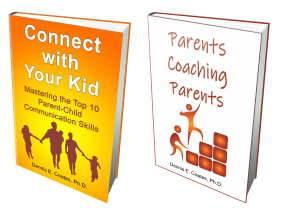I know several parents whose child is fast approaching adolescence. Even raising a sweet child can be difficult in many ways, but after puberty the challenges change. Middle school-aged children don’t want to be treated like sweet little kids anymore. Far from being adults, they seek adult-like privileges. They want more independence, more time away from home. And what they say and do can sometimes be shocking, frustrating, disappointing, and hurtful.
It’s only natural for a parent to react negatively to these incidents. There are many ways for an adult to express anger, including criticism, put-downs, name-calling, giving orders and playing the authority card. Communication can quickly devolve into a yelling match.
Yes, it’s natural to react emotionally in these situations. But the damages can be huge, setting up escalated battles for the future. Very quickly, a relationship can be derailed to the point that a child can stop believing they can trust or communicate with a parent. A child’s self-esteem can be damaged. They can disengage, seeking support elsewhere, usually among peers who are as immature as they are, or worse.
A parent’s reactivity is the cause, not the cure for these awful confrontations.
The solution is powerful, but difficult to adopt. In essence, the best action involves an improved skill, similar to anger management. It works like this:
- When negative emotions quickly surge, it’s fine to feel them. But rather than saying or doing anything to express them, immediately name them to yourself. I’m feeling frustrated because he said he would do this and for the third time, he didn’t do it. I’m hurt that she would say she hates me.
- Emotions flare, but they also subside. Take a few seconds to calm down. More self-talk can help: If I say what I’m feeling right now, I’ll only make things worse. And if I think about it, I may be partially to blame.
- Take a few more seconds to reach for a state of empathy: I don’t need to take this personally. It’s not really about me. Growing up isn’t easy, and there’s so much they don’t know at this age. Being a teen is more confusing than ever. With her brain still developing, it’s hard for her to always be rational and self-disciplined. Something is bothering her and I don’t know what it is.
This attempt at adult-level self-control can help you prevent a yelling match. You may falter at first, but don’t give up. The more you try it, the easier it will get.
So you successfully reign in your reactivity; what should you do next? My advice is always to engage effective communication skills. For me, these are a parent’s most powerful skills:
- Express empathy
- Listen to understand
- Give feedback
- Encourage
- Ask questions to stimulate thinking
- Dialogue
- Resolve conflict creatively
Young people react much differently when adults use these skills. I encourage you to click on the links to find articles that meet your current needs. Going forward I’ll have a lot more to say about each of these skills. For now, two things:
- Giving in to your natural emotional reactivity can ruin your relationship with your child.
- The answer is effective communication.
 For more about parent-child communication skills, get the book, Connect with Your Kid.
For more about parent-child communication skills, get the book, Connect with Your Kid.
This book, along with Parents Coaching Parents, will help you make change happen.

